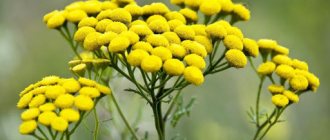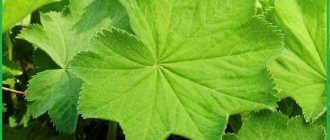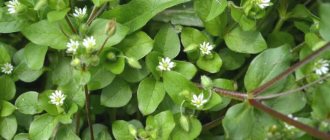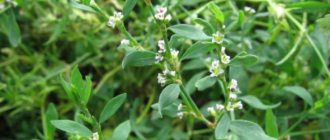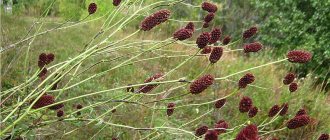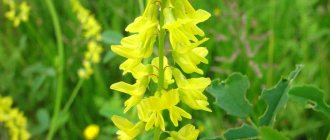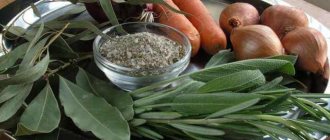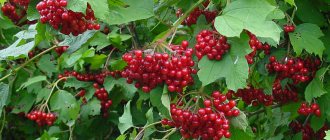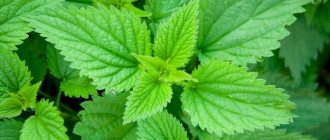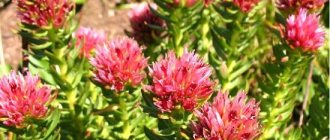Write a review
Reviews: 0
Manufacturers: Kyiv Pharmaceutical Factory
Active ingredients
- Creeping thyme herb
Disease class
- Not indicated. See instructions
Clinical and pharmacological group
- Not indicated. See instructions
Pharmacological action
- Expectorant
- Antimicrobial
- Analgesic (non-narcotic)
- Antibacterial
- Painkiller
Pharmacological group
- Antiseptics and disinfectants
- Secretolytics and stimulants of motor function of the respiratory tract
- Other non-narcotic analgesics, including non-steroidal and other anti-inflammatory drugs
What is thyme and why is it famous?
Thyme is a small herbaceous and very unpretentious essential oil plant, widely distributed in all climatic zones, on all continents. Its other name is creeping thyme from the Latin timus (small). People call it Bogorodskaya grass, because since ancient times miraculous properties have been attributed to it and used in religious rituals.
Ancient papyri indicate that thyme was used by Paracelsus and Avicenna to treat many diseases, based on experience. Modern medicine has laid the scientific foundation by determining the chemical composition and properties of thyme.
It contains many useful substances:
- essential (volatile) oils that have aromatic properties, calm the nervous system, dilate the bronchi, eliminate spasms;
- flavonoids – substances with antioxidant properties that cleanse the body;
- terpenes (thymol, carvacrol), which have antiseptic and stimulating properties;
- tannins with anti-inflammatory and anti-edematous effects;
- gum that stimulates recovery processes;
- organic pigments are powerful antioxidants;
- minerals necessary for cellular metabolism;
- vitamins – A, all group B, C, E, K, PP.
Such a rich composition of the plant allows it to be used for medicinal purposes in medicine and as a pleasant, healthy additive to the diet. Thyme is officially recognized by the world pharmacopoeia and is included in a number of internal and external medicines.
Similar drugs:
- Andipal Tablets
- Nimesil Granules for the preparation of suspension for oral administration
- Mataren plus Cream for external use
- Dollar () Oral tablets
- Nurofen Express Capsule
- Celebrex Capsule
- Nurofen Express Oral tablets
- Nalgesin Oral tablets
- Airtal Powder for the preparation of suspension for oral administration
- Naklofen Duo Capsule
** The Drug Directory is intended for informational purposes only. For more complete information, please refer to the manufacturer's instructions. Do not self-medicate; Before you start using the drug Thyme herb, you should consult a doctor. EUROLAB is not responsible for the consequences caused by the use of information posted on the portal. Any information on the site does not replace medical advice and cannot serve as a guarantee of the positive effect of the drug.
Are you interested in the drug Thyme herb? Do you want to know more detailed information or do you need a doctor's examination? Or do you need an inspection? You can make an appointment with a doctor - the Euro lab is always at your service! The best doctors will examine you, advise you, provide the necessary assistance and make a diagnosis. You can also call a doctor at home . Euro lab clinic is open for you around the clock.
** Attention! The information presented in this medication guide is intended for medical professionals and should not be used as a basis for self-medication. The description of the drug Thyme herb is provided for informational purposes and is not intended for prescribing treatment without the participation of a doctor. Patients need to consult a specialist!
If you are interested in any other drugs and medications, their descriptions and instructions for use, information about the composition and form of release, indications for use and side effects, methods of use, prices and reviews of drugs, or you have any other questions and suggestions - write to us, we will definitely try to help you.
The use of thyme for medicinal purposes
Both in folk and evidence-based medicine, thyme is used to treat many diseases, due to its multicomponent effect on the body. The herbaceous part of the plant is used in fresh and dry form to prepare infusions, decoctions, and ointments. Thyme flowers are an excellent honey plant, so honey from it also has beneficial and healing properties.
Treatment of respiratory diseases
For acute and chronic inflammatory processes of the respiratory tract, lungs and even tuberculosis, take a decoction, infusion or tea of thyme as an antiseptic, anti-inflammatory and expectorant. It is also part of pertussin, a well-known cough remedy.
To prepare the infusion, pour 1 tablespoon of dry herb into two glasses of boiling water and leave for 10 minutes. Take 1-2 tablespoons, or add to tea.
Treatment of diseases of the digestive system
For gastritis, enteritis, dysbacteriosis and intestinal disorders, brew 1 tablespoon with 300 ml of boiling water, infuse and take 100 ml three times a day before meals.
Treatment of the nervous system
For neuralgia and sleep disorders, brew a teaspoon with a glass of boiling water, leave for 5-10 minutes, take it as tea at night, preferably with honey.
Treatment of the genitourinary system
Thyme promotes the removal of sand and stones from the kidneys and bladder. It is part of the herbal collection along with lavender, mint, lemon balm and strawberries. Brew a tablespoon of the mixture with 2 cups of boiling water and leave for half an hour. Take warm, like tea, 1 glass in the morning and 1 at night.
In Eastern medicine, thyme is used to treat male diseases - prostatitis, decreased potency. A collection is prepared from equal parts of thyme, oregano and mint, brewed like tea, and drunk 1 glass in the morning and at night. Thyme oil is rubbed into the perineum, groin and genitals. You can buy it at the pharmacy, or you can prepare it yourself. Fill a small glass jar with crushed herbs, add vegetable oil to the brim - any kind, close and leave for 1 month.
External use of thyme
With an infusion or steam of thyme, you can gargle, rinse your nose, put drops in your eyes for inflammation, and rinse your mouth for inflammation of the gums and toothache. They also treat various skin injuries - wounds, burns, abrasions, ulcers. Compresses with a warm herbal decoction are also applied to the joints and spine.
Many women use douching with thyme decoction to prevent infections and cervical erosion. Also, many people rinse babies with a weak decoction of thyme after bathing to prevent diaper rash and skin infections.
The use of thyme in nutrition
The specific aroma and taste of thyme allows it to be used as a spicy and very healthy seasoning for various dishes: meat, fish, vegetables, and it is also used in the preparation of various sauces and added to salads.
Fresh and dried herbs are added to marinades, pickles and canned food; it imparts a bitterish piquant taste and aroma, and helps canned food retain its appetizing appearance longer.
Thyme tea is very popular and healthy; it can be prepared in its pure form, or added to green and black tea, combined with other herbs - strawberries, mint, lemon balm. In the summer heat, cold thyme tea is very useful.
Particular attention should be paid to such a valuable product as thyme honey, which combines unique beekeeping products with components of the plant itself. It is very useful for improving immunity, physical strength, and the nervous system and is recommended even for diabetics at a dose of 1 teaspoon per day with a glass of water or tea.
Thyme herb: medicinal properties and contraindications
Before we talk about the undeniable benefits of this plant, let’s look at what the herb in question is. And this is a perennial crop up to 15 cm tall. There is wild thyme, but if desired, gardeners grow the herb in their own beds. This moisture- and heat-loving plant is found in many regions of our country. Another name for thyme is creeping thyme. Thyme is known to many as a culinary seasoning.
Thyme grows in the countries of Eurasia, in the vast Mediterranean, Scandinavia, Britain, and the East. Needless to say that in our country thyme can be found in many regions? In our country, this medicinal plant is known, appreciated and widely used in various spheres of life.
What does thyme look like?
Walking through a wooded area or near a country pond, you can see small bushy branches with soft lilac flowers. The stems of the plant are thin and low. The grass blooms with thick, lush umbrellas. The leaves are small, pointed, with a velvety texture. Thyme grows in clusters, forming small lilac “islands” in the place of growth. Therefore, finding wild creeping thyme is not a problem!
The enormous popularity of thyme in medicine can easily be explained by its composition.
After all, this plant contains:
- vitamin A,
- beta carotene,
- B vitamins,
- Vitamin C,
- potassium,
- calcium,
- manganese,
- selenium,
- iron,
- barium,
- zinc.
100 g of product contains:
- carbohydrates - 24 g;
- fats - 1.7 g;
- proteins - 5.5 g.
The total amount of calories is 100 Kcal.
The plant also contains water - up to 60% and dietary fiber - about 15 grams.
Particular attention should be paid to such a substance that is part of thyme as thymol - this is an aromatic component that occupies 50% of the essential oils of the plant. This is a very strong substance that has a pronounced antiseptic, expectorant, and analgesic effect. However, thymol can irritate the mucous membranes and (with individual intolerance) cause an allergic reaction.
It is thanks to thymol that thyme smells fragrant and attracts with its enchanting aroma.
Thyme: medicinal properties
We know about the healing properties of this medicinal herb from our grandmothers! Thyme tea is a universal remedy that has been used to treat coughs, runny noses, relieve pain and fever, and protect against infections. Anyone who has tried it knows that it really helps. Tea, decoction and infusion of this wonderful herb energize and invigorate, and also help smooth out the symptoms of colds and flu. But this is not the only benefit that can be obtained from thyme.
With the help of this medicinal herb, diseases are treated and prevented:
- gastrointestinal tract;
- of cardio-vascular system;
- nerves and central nervous system;
- kidneys and urinary system;
- liver and gall bladder;
- musculoskeletal tissue;
- immune system.
Considering the composition of this plant, it is easy to guess that thyme provides its small benefit to almost every department of the body.
This weed:
- relieves tone and eliminates anxiety;
- relieves pain and calms spasms;
- heals wounds and suppresses the spread of pathogenic flora;
- provokes a restorative and restorative effect;
- works as a means of diluting and facilitating the discharge of sputum;
- regulates intestinal function, eliminates constipation/diarrhea;
- has an antiparasitic effect;
- suppresses fungal activity;
- provides a lasting rejuvenating effect.
With the help of thyme, you can overcome insomnia and cope with chronic fatigue syndrome. This plant works wonders in the treatment of joints, cartilage and bone tissue.
Medicinal properties of thyme and contraindications for women
I would especially like to note the benefits of thyme for women's health! During the active phase of menstruation, tea with thyme can reliably reduce pain and smooth out mood swings. This plant protects against many female diseases, as it has a detrimental effect on pathogenic bacteria and fungi, and also relieves inflammation. Thyme is good for losing weight and fighting cellulite. Decoctions based on this herb are used for rinsing hair and washing. This helps restore the lost strength of the hair root, restore the shine and strength of the hair. Washing with thyme is a method of combating acne, acne, and peeling. This plant restores healthy skin color and slows down the aging process.
Important! It is not recommended to use this medicinal herb during pregnancy. Some substances contained in thyme can cause uterine tone. This condition often causes miscarriages and premature births.
What are the benefits of thyme for men's health?
This plant restores and increases potency, protects against the development of diseases of the male reproductive system (prostatitis, prostate adenoma, urethiritis, etc.). Thyme is good for maintaining the heart muscle and strengthening blood vessels. This medicinal plant helps to resist fatigue and stress. Many men face the problem of baldness. And here thyme also comes to the rescue! Decoctions, oils and masks based on this herb have a healing effect on the scalp and hair follicles.
For children
It is not recommended to give thyme to certain children (up to 3 years of age). After 3 years, you can try thyme tea with caution. This plant is very useful for children. It has a beneficial effect on the intestines and digestion. Firstly, thyme helps digest heavy foods and prevents the formation of colic and stool upset. Secondly, with the help of tea with thyme, they successfully cope with increased gas formation and flatulence. This plant has a mild hypnotic effect. With thyme tea you can achieve a calming effect. Thyme copes well with coughs, helps cough up and removes phlegm. Creeping thyme is also useful for sinusitis. Due to its thinning properties, stagnation of mucus does not form, which helps to avoid the development of frontal sinusitis and sinusitis.
Of course, before offering thyme to your child, you should consult with your pediatrician!
Contraindications
Adults should also not use medicinal plants thoughtlessly! It is important to consider a number of contraindications.
These include:
- individual intolerance to the plant;
- heart failure, arrhythmia;
- acute period of intestinal disorder;
- food allergy in the acute period;
- pregnancy and breastfeeding;
- gastric ulcer in the acute phase;
- gastritis with high acidity.
Any chronic and acute diseases, special conditions may be a contraindication for the use of thyme! Need specialist advice.
